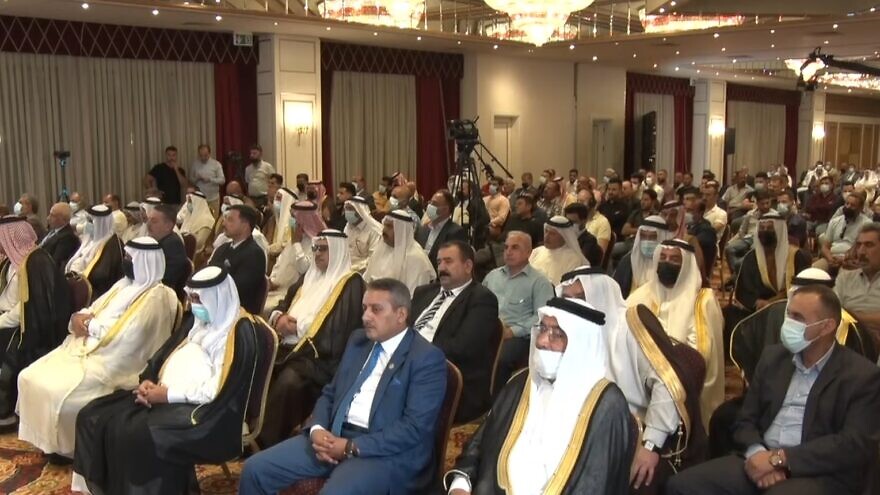It has the air of a witch-hunt. Many of the 300 leaders of Iraqi civil society, Sunni and Shi’a, who gathered in the Kurdish region last week for a conference advocating an Iraqi peace accord with the State of Israel, are now the subjects of arrest warrants from the authorities and death threats from Islamist militias.
Iraq’s president and prime minister led the chorus of condemnation, invoking a long-standing law that punishes as traitors those Iraqis who maintain contacts with Israelis or promote normalization efforts with the Jewish state. The threats from Iranian-backed Shia militias were more ominous. “We shall not abate from pursuing those traitors wherever they are,” threatened the Saraya Awlia al-Dam (“Guardians of the Blood”) Brigade, a group that is responsible for the killing of an American contractor back in February in a missile attack on the Kurdish capital of Erbil, the same city where last week’s conference took place. Not to be outdone, the veteran pro-Iranian Shi’a leader Muqtada al-Sadr declared that if the conference participants were not arrested, “we will take strict national measures against the normalizations and the recreant.”
The same message was articulated by Dr. Sahar Al-Ta’i, head of research at the Iraqi Ministry of Culture, who told the conference, “We want peace with Israel.” And a former Iraqi military commander who participated in a failed coup against the Ba’athist dictator Saddam Hussein in 1989, Maj. Gen. Amir al-Jubouri, declared: “Abraham, peace be upon him, birthed a nation that paved the way for peace. Today, we and all his descendants from the three main religions bear responsibility to complete this path together.”
But now that the arrest warrants and the threats have emerged, the pleasing narrative that emerged from the conference is looking shaky. Himself the target of an arrest warrant, there were reports that Al-Hardan was being protected by the Kurdish authorities. Other reports claimed that Al-Hardan had disavowed the conference entirely, claiming that the article published in the Journal had been written on his behalf without his approval, though it was unclear whether he had been compelled to say that. Even more worryingly, nothing has been heard from Dr. Al-Ta’i, who also has an arrest warrant in her name, since the conference ended.
The lot of political dissidents in Iraq has always been a brutal one, and so there is every reason to fear that a combination of arrests and propaganda will be unleashed to crush the nascent movement for peace with Israel. Nearly two decades after the overthrow of Saddam’s regime, Iraq’s government still regards the question of peace with Israel through the lens of Arab and Islamic loyalty rather than national interest. Their position also underlines the fact that Israel is now a dividing line within the Arab and Islamic worlds. Those states that cross the line do so because they have dispensed with the fiction of Arab unity that brought a succession of disastrous and costly wars in which Israel’s armed forces were victorious. They also see the economic and educational benefits of partnerships with Israel. But elsewhere in the Middle East—in Baghdad, in Tehran, in Beirut—such thinking is still regarded as heretical. And heretics are persecuted.
One might have hoped that the United States—which continues to participate in military efforts to counter the Islamists of Da’esh, wields some influence in Baghdad and is explicitly committed to expanding the Abraham Accords—would have welcomed the Erbil conference and spoken out in defense of those participants now being hunted down. But an official statement from the U.S.-led coalition would only state they “had no prior knowledge of the event, nor do we have any affiliation with its participants.” As Robert Satloff of the Washington Institute for Near East Policy think-tank pointed out in a tweeted response, the question was not whether American officials had advance knowledge of the conference, but “whether, on a policy level, the U.S. government supports the right of brave Iraqis to gather in support of the U.S. goal of broadening the Abraham Accords and peace with Israel.”
Given the current bleak political mood in the United States, there is little reason to pursue those goals, especially if doing so antagonizes the Iraqi government. The Biden administration’s silence suggests that they will only talk up the Abraham Accords when an Arab government announces its intention to make peace. Those Arab citizens who want to make peace with Israel in spite of their rulers are effectively being told that they are on their own.


























